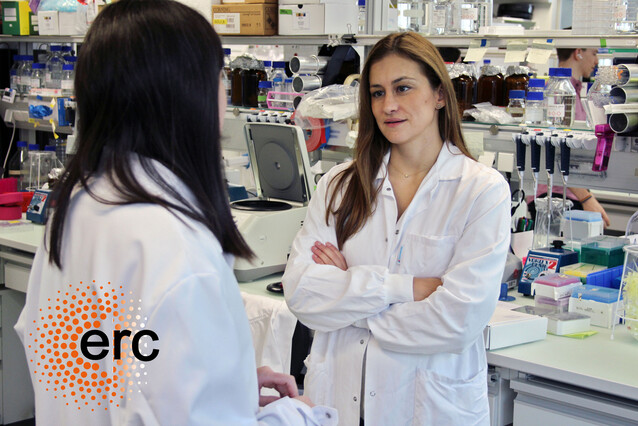ERC Consolidator Grant to study how to unlock an immune response in cancer
Immunotherapies that direct the immune system against cancer and targeted therapies that inhibit cancer-causing signalling pathways have revolutionised the treatment of cancer patients. However, their use as individual therapies fails to achieve durable tumour control in most patients, and the development of combination therapies is difficult.The European Research Council (ERC) awarded a Consolidator Grant to senior group leader Anna Obenauf to study tumours and their microenvironment during therapy-challenge with the goal to inform rational combination therapies and to unleash a potent immune response towards cancer cells. With this achievement, the IMP scores its sixth ERC grant this year.
Anna Obenauf's research focuses on the evolving landscape of cancer treatment, including the challenges associated with therapies such as KRAS inhibitors. In a significant stride toward advancing cancer treatment, Obenauf has successfully secured an ERC Consolidator Grant for her project, 'UnlockIT: Unleashing T cell-mediated Immune response in therapy-challenged Tumours'. The grant will empower Obenauf and her lab to delve into the dynamics of cancer cells and the tumour microenvironment under the influence of targeted therapy.
The UnlockIT project leverages Obenauf's expertise in modelling dynamic changes in cancer cells and their tumour microenvironment throughout various phases of therapy. The central aim is to investigate the coevolution of tumours and their microenvironment when undergoing treatment with KRAS inhibitors, and related mechanisms of drug resistance. The team will employ innovative tools such as their improved molecular time machine, CaTCHseq – developed with the support of the ERC Starting Grant 'CombaTcancer' – alongside novel KRAS inhibitors and unique KRAS-driven tumour models. They hope to gain insights that will pave the way for strategic, mechanism-based combination therapies.
Obenauf and her team aspire to lay a rational foundation for combining targeted therapies and immunotherapies, with the ultimate goal of informing clinicians to apply more effective and durable cancer treatments.
“Securing this prestigious ERC grant wouldn’t have been possible without the immense efforts of my talented research team, partners at the IMP and around the world, and of course my family," says Obenauf. "This project was shaped by a tight collaboration with Christian Umkehrer and Matthias Samwer at Boehringer Ingelheim who contributed to developing CaTCHseq. Others have provided crucial expertise and resources. I’m incredibly grateful for their support and look forward to what we can achieve together through UnlockIT.”
Anna Obenauf's success in securing this grant marks a record for the IMP, as it is the sixth ERC grant received in 2023.
About the ERC
The European Research Council (ERC), set up by the European Union in 2007, is the premier European funding mechanism for excellent frontier research. It funds creative researchers of any nationality and age, to run projects based in participating countries. The ERC offers four core grant schemes: Starting Grants, Consolidator Grants, Advanced Grants and Synergy Grants. With its additional Proof of Concept Grant scheme, the ERC helps grantees to bridge the gap between their pioneering research and early phases of its commercialisation. The ERC is led by an independent governing body, the Scientific Council. Since November 2021, Maria Leptin is the President of the ERC. The overall ERC budget from 2021 to 2027 is more than 16 billion Euro, as part of the Horizon Europe programme, currently under the responsibility of European Commission Executive Vice President Margarete Vestager.
Further reading
